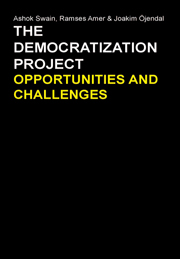Book contents
- Frontmatter
- Contents
- List of Tables
- List of Figures
- Acknowledgements
- Contributors
- The Democratization Project: Opportunities and Challenges
- 1 The Democratization Project: Peace, Conflict and Development
- 2 Non-Authorized Military Interventions and Legitimization by the United Nations
- 3 From Condemnation to Legitimization of Outcome: The United Nations and the Use of Force in Inter-State Relations
- 4 Demos or Deus: Patterns of Religious Dimensions in Asian Armed Conflicts, 1945–2005
- 5 The Left and Democratic Consolidation – Deepening Democracy in Latin America?
- 6 Democracy without People? – The Risk of Monopolizing the Democratization Project
- 7 The Role of Hamas in Building Palestinian Democracy in the Midst of Violence
- 8 Elections and Violence in Sri Lanka: Understanding Variation Across Three Parliamentary Elections
- 9 Post-Accord Elections and Armed Conflict
- 10 Peace Through Democracy? The Challenges of Postwar Democratization in Weak and War-Torn States
9 - Post-Accord Elections and Armed Conflict
Published online by Cambridge University Press: 05 March 2012
- Frontmatter
- Contents
- List of Tables
- List of Figures
- Acknowledgements
- Contributors
- The Democratization Project: Opportunities and Challenges
- 1 The Democratization Project: Peace, Conflict and Development
- 2 Non-Authorized Military Interventions and Legitimization by the United Nations
- 3 From Condemnation to Legitimization of Outcome: The United Nations and the Use of Force in Inter-State Relations
- 4 Demos or Deus: Patterns of Religious Dimensions in Asian Armed Conflicts, 1945–2005
- 5 The Left and Democratic Consolidation – Deepening Democracy in Latin America?
- 6 Democracy without People? – The Risk of Monopolizing the Democratization Project
- 7 The Role of Hamas in Building Palestinian Democracy in the Midst of Violence
- 8 Elections and Violence in Sri Lanka: Understanding Variation Across Three Parliamentary Elections
- 9 Post-Accord Elections and Armed Conflict
- 10 Peace Through Democracy? The Challenges of Postwar Democratization in Weak and War-Torn States
Summary
Introduction
A large number of elections are held each year with the specific purpose of promoting peace. However, there is an increasing appreciation of the obstacles involved in electoral processes in war-torn societies. Elections are often postponed for security reasons. When elections are held, they are often fraudulent, and marred by violence and boycotts. Former warring parties frequently play a key role in war-shattered societies and the very issues that caused the armed conflict are often reflected in the electoral contestation. An increasing body of literature on war-torn societies has concluded that elections can even increase the risk of violent conflict. The parliamentary elections in Macedonia and Sierra Leone in 2002 and in Burundi in 2005 served the purpose of sealing the respective peace agreement and established a new order of governance. However, several other elections held after a peace agreement, such as the ones held in Angola 1992, Cambodia 1993 and the Congo 2002, were followed by armed conflicts. These cases raise a pertinent question about post-accord elections. Why do some war-torn countries manage to hold elections without subsequent armed conflict, whereas elections in other countries are followed by such conflicts?
The study is motivated by three reasons. First, there is a policy need for improved knowledge on the role of elections in building peace. Election is not only a key component of democratization efforts, but has also become part of the peacebuilding agenda.
- Type
- Chapter
- Information
- The Democratization ProjectOpportunities and Challenges, pp. 153 - 164Publisher: Anthem PressPrint publication year: 2009

